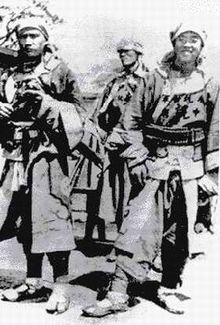
Back کانسو براوز Persian Tentara Gansu ID Kansu Braves Italian Bravos de Kansu Portuguese 甘军 Chinese
| Gansu Braves | |
|---|---|
 Three Muslim soldiers from the Gansu Army | |
| Active | 1895–1901 |
| Country | |
| Allegiance | |
| Branch | Wuwei Corps |
| Type | Army |
| Role | Force protection Land warfare Public security |
| Size | Division ~10,000 |
| Garrison/HQ | Gansu, then Beijing |
| Nickname(s) | Kansu Braves |
| Equipment | Krupp artillery, Mauser rifles, swords, halberds |
| Engagements | Dungan revolt (1895–96) Battle of Langfang Siege of the International Legations (Boxer Rebellion) Battle of Peking |
| Commanders | |
| Notable commanders | Dong Fuxiang (general in chief) Ma Fuxiang, Ma Fulu, Ma Fuxing |
| Kansu Braves | |||||||||||||||
|---|---|---|---|---|---|---|---|---|---|---|---|---|---|---|---|
| Traditional Chinese | 甘軍 | ||||||||||||||
| Simplified Chinese | 甘军 | ||||||||||||||
| Literal meaning | Gansu Army | ||||||||||||||
| |||||||||||||||
The Gansu Braves or Gansu Army was a combined army division of 10,000 Chinese Muslim troops from the northwestern province of Kansu (Gansu) in the last decades of the Qing dynasty (1644–1912). Loyal to the Qing, the Braves were recruited in 1895 to suppress a Muslim revolt in Gansu. Under the command of General Dong Fuxiang (1839–1908), they were transferred to the Beijing metropolitan area in 1898, where they officially became the Rear Division of the Wuwei Corps, a modern army that protected the imperial capital. The Gansu Army included Hui Muslims, Salar Muslims,[1][2][3] Dongxiang Muslims, and Bonan Muslims.
The Braves, who wore traditional uniforms but were armed with modern rifles and artillery, played an important role in 1900 during the Boxer Rebellion. After helping to repel the Seymour Expedition, a multinational foreign force sent from Tianjin to relieve the Beijing Legation Quarter in early June, the Muslim troops were the fiercest attackers during the siege of the legations from 20 June to 14 August.[4] They suffered heavy casualties at the Battle of Peking, in which the Eight-Nation Alliance relieved the siege. The Kansu Braves then guarded the Imperial Court on their journey to Xi'an.
- ^ 秉默, ed. (16 October 2008). "韩有文传奇 然 也". 中国国民党革命委员会中央委员会. 民革中央. Archived from the original on 5 March 2016.
- ^ 朱, 国琳 (3 March 2011). "马呈祥在新疆". 民族日报-民族日报一版 | 民族日报数字报刊平台. Archived from the original on 4 March 2016.
- ^ 韩, 芝华 (16 October 2009). "怀念我的父亲──韩有文". 中国国民党革命委员会新疆维吾尔自治区委员会. Archived from the original on 6 September 2017.
- ^ Travels of a Consular Officer in North-West China. CUP Archive. 1921. p. 110.